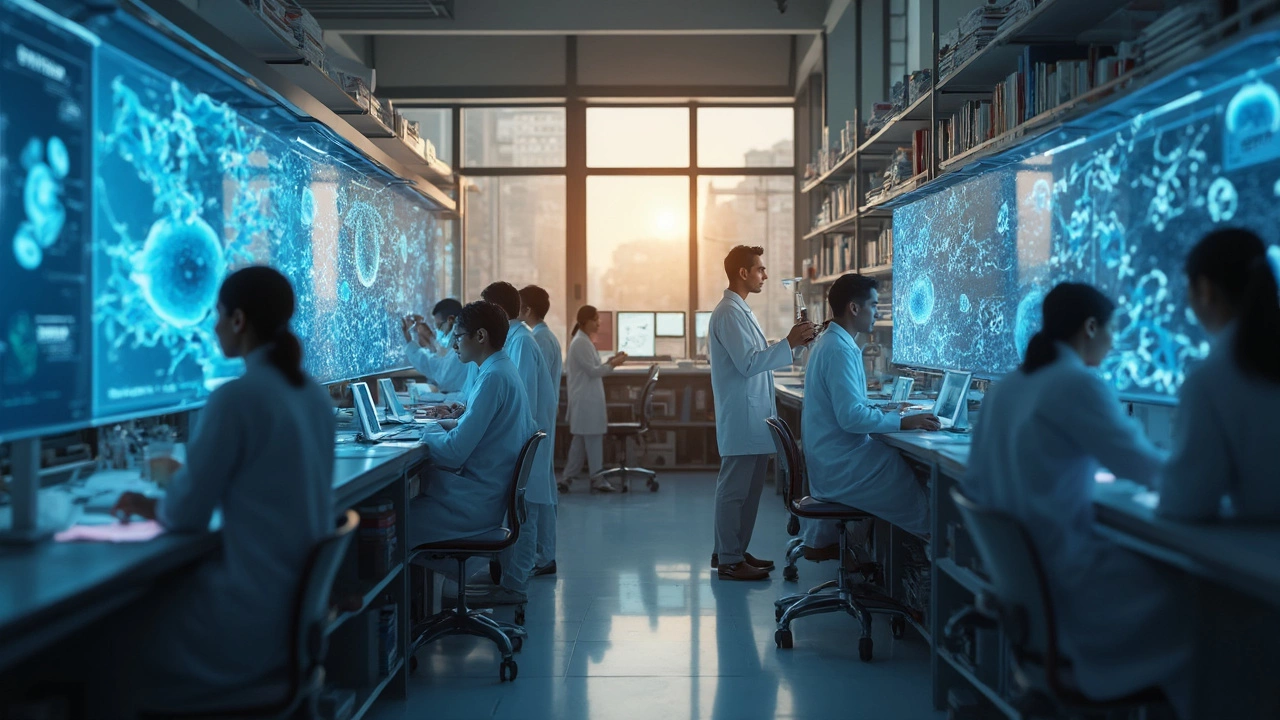-
23

Can Cancer Be Cured Completely? A Deep Dive into Modern Treatments
Have you ever wondered if cancer could be completely cured? It's a question that many people ask, especially with so many advancements in medicine today. Cancer is one of those diseases that everyone seems to know about, but understanding why it's so tough to beat can be a real puzzle.
Basically, cancer isn't just one disease. It's a whole bunch of different diseases, and they don't all behave the same way. This makes it super tricky to find a 'one-size-fits-all' cure. It's like playing a game of whack-a-mole; get rid of one lump, and another pops up.
But don't lose hope—there's a lot happening in the world of cancer treatment right now. From targeted therapies that go straight for the cancer cells to immunotherapies that help your body's own defenses fight back, there's more going on than you'd think.
So, why isn't there already a complete cure? Well, it comes down to biology and some quirky features of cancer. It evolves and adapts like a sneaky chameleon. This means researchers have to stay on their toes, constantly coming up with new strategies.
- Understanding Cancer and Its Complexities
- The Latest Advances in Cancer Treatment
- Challenges in Finding a Complete Cure
- The Future of Cancer Treatments
Understanding Cancer and Its Complexities
The biggest challenge in dealing with cancer is that it's not just a single disease. It's more like an umbrella term that covers over 100 different types of diseases. Sounds crazy, right? Each type of cancer has its own unique set of traits and behaviors, making the process of developing treatments more complicated.
At its core, cancer happens when cells in the body grow out of control. Normally, cells grow and divide to make more cells only when the body needs them. However, in the case of cancer, cells keep on forming even when they're not needed, and older, damaged cells don't die when they should. These extra cells can form a mass that's often referred to as a tumor.
Types of Cancer
Here's a quick breakdown: cancers are generally categorized into five main types:
- Carcinomas - These start in the skin or tissues lining organs.
- Sarcomas - Found in bone, fat, muscle, or other connective tissues.
- Leukemias - Affect blood and bone marrow.
- Lymphomas - Begin in the immune system.
- CNS Cancers - Occur in the brain and spinal cord.
Different strategies are required to tackle each type. This is why it often feels like we're playing catch-up in the cancer treatment game.
How Cancer Spreads
Another tricky part about cancer is metastasis. This is when cancer cells break away from the original tumor and travel through the blood or lymph system to form new tumors in other parts of the body. It's like having an intruder who not only camps out in your house but invites all their friends over and starts a wild party in every room.
| Common Cancer Types | Estimated New Cases (2025) | Estimated Deaths (2025) |
|---|---|---|
| Breast Cancer | 280,000 | 43,000 |
| Lung Cancer | 220,000 | 135,000 |
| Prostate Cancer | 192,000 | 33,000 |
These numbers are reminders of how pervasive cancer still is, and why understanding its complexities is key to defeating it.
Each advancement in oncology takes us one step closer, but it requires this deep understanding to truly make a difference.
The Latest Advances in Cancer Treatment
In the hustle and bustle of today's medical world, advancements in cancer treatment are truly game-changing. If you've been following the progress, you might already know that therapies have become way more targeted. This essentially means they home in on cancer cells and leave your healthy cells alone, which is a massive win for minimizing those nasty side effects.
Targeted Therapy
This kind of therapy is all about precision. Drugs are designed to target specific markers on cancer cells. For example, certain breast cancers have a receptor known as HER2. Targeted drugs like Trastuzumab bind to these receptors, effectively shutting down the tumor's growth machinery.
Immunotherapy
Another big player in the field these days is immunotherapy. It’s all about harnessing your body's immune system to attack cancer. It’s like giving your immune system a little pep talk or maybe even armor. PD-1 inhibitors and CAR T-cell therapy are making waves as they’re showing promise in various types of cancer, like melanoma and leukemia.
Advancements in Radiotherapy
Radiotherapy isn’t what it used to be. Today’s techniques, like proton therapy, are way more precise. They beam radiation to exactly where it’s needed, protecting surrounding tissues. This leap in technology means fewer side effects and better control of tumors.
Stats Worth Noting
According to recent studies, the 5-year survival rate for many cancer types has increased thanks to these advanced treatments. Here's a brief look:
| Cancer Type | 5-Year Survival Rate Increase |
|---|---|
| Melanoma | 40% to 45% |
| Breast Cancer | 85% to 90% |
| Leukemia | 50% to 60% |
So, what's the takeaway here? While we’re still in the hunt for that complete cure for cancer, these advancements are giving people more years and better quality of life. It's like going from dial-up internet to fiber optic—the difference in experience is just that stark.

Challenges in Finding a Complete Cure
Understanding why cancer is so tough to cure is like peeling back the layers of an onion—there's always more underneath. One major hurdle is that cancer, as we know it, isn't just one disease. It includes at least 100 different types, each with its own characteristics and complexities. This diversity alone makes it a real challenge for researchers to come up with a universal cure.
Genetic Variability
Each cancer patient's illness can be as unique as their fingerprint. Genetic differences are a big deal. Cancer cells mutate quickly, and these mutations can lead to resistance against treatments that used to work. As Dr. Steven Rosenberg, Chief of Surgery at the National Cancer Institute, once said,
“Every tumor is different, every patient is different, and this requires a highly personalized approach.”
So, while one treatment might work wonders for one person, it might not even make a dent for someone else.
Detection and Diagnosis
Imagine trying to solve a problem that you can't even see. That's what happens when cancer goes undetected until it reaches an advanced stage. Early detection is critical, but it's tricky. Some cancers, like pancreatic and ovarian, often have no symptoms until they're pretty advanced. The lack of early signs gives the disease a head start, making it hard to treat by the time it gets discovered.
Technological and Financial Barriers
Cutting-edge tools and research aren't cheap. Developing new cancer treatment methods and getting them approved can take years and cost a small fortune. Not to mention, once a new therapy is developed, getting it to every patient who needs it can be a monumental task, especially when resources are limited.
Statistics Overview
Let's look at some numbers to put this into perspective:
| Cancer Type | 5-Year Survival Rate |
|---|---|
| Breast | 90% |
| Pancreatic | 10% |
| Lung | 22% |
These stats highlight just how differently each type of cancer can behave and why a blanket cure isn't so easy to come by.
The Future of Cancer Treatments
Looking ahead, the world of cancer treatment is buzzing with innovation and hope. So, what does the future hold? It seems like a mix of technology, smart science, and some pretty cool ideas are shaping how we might tackle cancer going forward.
Personalized Medicine
One of the most exciting prospects is personalized medicine. This isn't about some new miracle drug; it's all about tailoring treatment to the individual. Imagine doctors looking at a patient's unique genetic makeup and crafting a cancer cure just for them. It's like customizing a suit but for your health. This approach is promising because it goes for the specifics, making therapy potentially more effective and with fewer side effects.
Advancements in Immunotherapy
Immunotherapy is another hot topic. It's all about boosting the body's own defenses to fight cancer. Researchers are finding ways to supercharge your immune system so it can recognize and destroy cancer cells more effectively. Think of it as giving your immune cells a pair of superhero glasses to spot the bad guys.
Smart Tech and AI
Then there's the rise of smart technology and artificial intelligence. AI is being used to predict how cancers might respond to different treatments, making it easier to choose the best plan. Plus, tech like wearable devices can help monitor patients in real-time, providing data that could significantly improve outcomes.
Accessible Treatments for All
Of course, it's not just about fancy tech. Ensuring these breakthroughs are accessible to everyone is a key challenge. The goal is a world where cutting-edge cancer treatment is available to all, not just the privileged few.
| Innovation | Expected Impact |
|---|---|
| Personalized Medicine | Higher efficiency and fewer side effects |
| Immunotherapy | Stronger, targeted immune response |
| AI and Smart Tech | Better treatment prediction and monitoring |
The future might not hold a blanket cancer cure yet, but with these advances, we're moving closer, making it easier for people to live healthier and longer lives even if they get diagnosed.